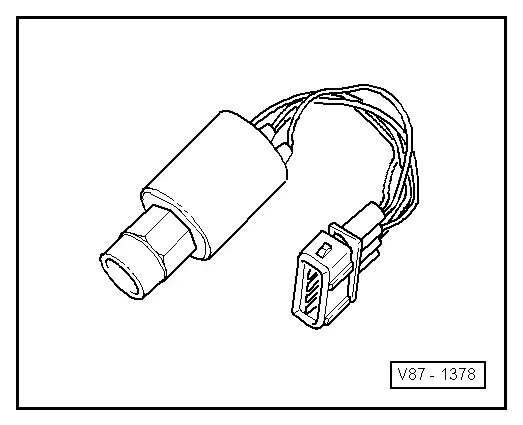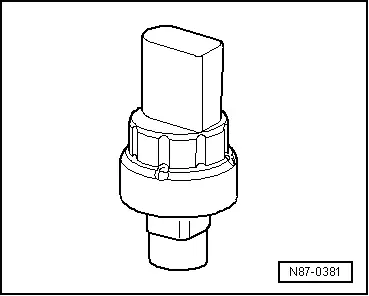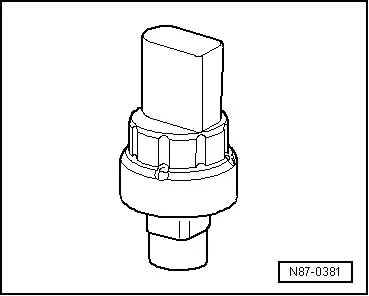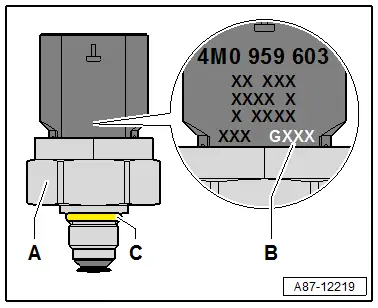Audi Q5: A/C Pressure Switch -F129-
 Note
Note
Switch pressures, removing and installing switches as well as switch arrangement and version. Refer to vehicle specific refrigerant circuit → Heating, Ventilation and Air Conditioning; Rep. Gr.87; System Overview - Refrigerant Circuit (vehicle-specific repair manual).
This pressure switch has 3 functions:
1. Switches the coolant fan to the next higher level when the pressure in the refrigerant circuit increases (approximately 16 bar (232 psi) ).
2. Switches off A/C system if pressure is excessive (approximately 32 bar (464 psi) ), for example because of insufficient engine cooling.
3. Switches off A/C system if pressure is insufficient (approximately 2 bar (29 psi) ), for example loss of refrigerant.
 Note
Note
A/C Pressure Switch -F129- replaces the A/C Refrigerant High Pressure Switch -F23-, A/C Refrigerant Low Pressure Switch -F73- and the Magnetic Clutch High Pressure Switch -F118-.

High Pressure Sensor -G65-, Refrigerant Circuit Pressure Sensor -G805-
- This High Pressure Sensor -G65- is installed instead of the A/C Pressure Switch -F129- or the A/C Pressure/Temperature Sensor -G395-.
- The Refrigerant Circuit Pressure Sensor -G805- replaces the High Pressure Sensor -G65- on specific vehicles from a specific version and from a specific date of manufacture.
- When a voltage is applied, a version of the High Pressure Sensor -G65- generates a square wave signal and the others a data telegram. This signal changes along with pressure in the system. When voltage is applied, the other versions and the Refrigerant Circuit Pressure Sensor -G805- exchange information with the Data bus (i.e. via the "LIN-Bus") with the corresponding control module. Refer to → Heating, Ventilation and Air Conditioning; Rep. Gr.87; System Overview - Refrigerant Circuit (vehicle-specific repair manual).
- On Audi A3 from MY 2005 and Audi Q3. a High Pressure Sensor -G65- is installed, for example, which emits its measured values to the corresponding control module (for example to the A/C Control Module -J301- or the Climatronic Control Module -J255-). On Audi Q7 from MY 2016, a High Pressure Sensor -G65- is installed, for example, which sends its measured values via a "LIN Bus". Use the Vehicle Diagnostic Tester ("OBD" function or A/C system "Guided Fault Finding") and → Wiring diagrams, Troubleshooting & Component locations.
- The Refrigerant Circuit Pressure Sensor -G805- is installed on the Audi A3 from MY 2013, for example. It exchanges information with the corresponding control module (on Audi A3, the A/C Control Module -J301- or the Climatronic Control Module -J255-) via a data bus cable. Refer to → Wiring diagrams, Troubleshooting & Component locations
- The A/C Pressure/Temperature Sensor -G395-, the Refrigerant Circuit Pressure Sensor -G805- and the High Pressure Sensor -G65- are available in different versions. Currently the sensor's only exterior difference is the parts number. Therefore, make sure that the part numbers are correctly allocated when replacing them (part number Parts Catalog ). Reason: These sensors produce different signals that can only be evaluated by the respective control modules using the → Vehicle Diagnostic Tester (function "OBD" or "Guided Fault Finding" for the A/C system). Refer to → Heating, Ventilation and Air Conditioning; Rep. Gr.87; System Overview - Refrigerant Circuit (vehicle-specific repair manual).
- The High Pressure Sensor -G65- and the Refrigerant Circuit Pressure Sensor -G805- only transmits the measured value for the refrigerant circuit pressure to the connected control module. The A/C Pressure/Temperature Sensor -G395- transmits the measured value for the refrigerant circuit pressure and the measured temperature to the connected control module. Even though only the pressure signal is evaluated on a vehicle, an A/C Pressure/Temperature Sensor -G395- is not and must not be installed on a vehicle for which a High Pressure Sensor -G65- or a Refrigerant Circuit Pressure Sensor -G805- is designed. Refer to Parts Catalog.
- The downstream control modules (Radiator Fan Control Module, Engine Control Module, Front A/C Display Control Head -E87- or Climatronic Control Module -J255-, etc.) use this signal to calculate the refrigerant circuit pressure and activate the radiator fans, the motor, and the A/C Clutch -N25- if necessary, or to change the activation of the A/C Compressor Regulator Valve -N280-. Use the Vehicle Diagnostic Tester ("OBD" or "Guided Fault Finding" function). Refer to → Heating, Ventilation and Air Conditioning; Rep. Gr.87; Refrigerant Circuit; System Overview - Refrigerant Circuit (vehicle-specific repair manual).

A/C Pressure/Temperature Sensor
There are different versions of this sensor with different functions and with different names. For exact name, allocation and notes doe the respective function, refer to → Heating, Ventilation and Air Conditioning; Rep. Gr.87; Refrigerant Circuit; System Overview - Refrigerant Circuit (vehicle-specific repair manual).
 WARNING
WARNING
There is a risk of freezing.
Refrigerant may leak out if refrigerant circuit is not discharged.
There are different versions of this sensor (sensor for a connection to the refrigerant circuit with or without the valves). Refer to → Heating, Ventilation and Air Conditioning; Rep. Gr.87; Refrigerant Circuit; System Overview - Refrigerant Circuit (vehicle-specific repair manual).
- Before loosening the threaded connection of the sensor check the version. Refer to → Heating, Ventilation and Air Conditioning; Rep. Gr.87; Refrigerant Circuit; System Overview - Refrigerant Circuit.
- On a sensor for the connection on the refrigerant circuit without a valve. The refrigerant must be extracted before loosening the threaded connection. If sensor is not removed within 10 minutes after extraction, pressure may build up in refrigerant circuit by renewed evaporation. Extract the refrigerant again.
Sensor for a connection with the valve on the refrigerant circuit
 Note
Note
- There are different versions of this sensor with different functions and with different names. The following illustrated A/C Pressure/Temperature Sensor -G395- is for example installed on an Audi A4, Audi Q5, and Audi Q5 hybrid. Refer to → Heating, Ventilation and Air Conditioning; Rep. Gr.87; Refrigerant Circuit; System Overview- Refrigerant Circuit.
- There are various designations, depending on the function and the vehicle. Refer to → Heating, Ventilation and Air Conditioning; Rep. Gr.87; Refrigerant Circuit; System Overview - Refrigerant Circuit.
Possible names for this sensor
- A/C Pressure/Temperature Sensor -G395- (for example on Audi Q5 hybrid)
- High Pressure Sensor -G65- (for example on Audi A4)
- Refrigerant Circuit Pressure Sensor -G805- (for example on Audi A3 e-tron)

 Note
Note
The Refrigerant Circuit Pressure Sensor -G805- is installed instead of for example the High Pressure Sensor -G65- or the A/C Pressure/Temperature Sensor -G395-. Refer to → Heating, Ventilation and Air Conditioning; Rep. Gr.87; Refrigerant Circuit; System Overview - Refrigerant Circuit.
- The A/C Pressure/Temperature Sensor -G395-, the Refrigerant Circuit Pressure Sensor -G805- and the High Pressure Sensor -G65- are available in different versions. Currently the sensor's only exterior difference is the parts number. Therefore, make sure that the part numbers are correctly allocated when replacing them (part number from the Parts Catalog). Reason: These sensors produce different signals that can only be evaluated by the respective control modules using the Vehicle Diagnostic Tester (function "OBD" or "Guided Fault Finding" for the A/C system). Refer to → Heating, Ventilation and Air Conditioning; Rep. Gr.87; System Overview - Refrigerant Circuit (vehicle-specific repair manual).
- When voltage is applied, the A/C Pressure/Temperature Sensor -G395- (and the Refrigerant Circuit Pressure Sensor -G805- exchange information via the Data bus (for example via the "LIN-Bus") with the corresponding control module. The relevant control module uses this information to calculate the pressure (and temperature) in the refrigerant circuit and any faults detected are signaled to the control module.
- The A/C Pressure/Temperature Sensor -G395- transmits the measured value for the refrigerant circuit pressure and the measured temperature to the connected control module. The Refrigerant Circuit Pressure Sensor -G805- only transmits the measured value for the refrigerant circuit pressure to the connected control module. Even if only the pressure signal is evaluated on most vehicles, no Refrigerant Circuit Pressure Sensor -G805- is or will be installed in a vehicle in which a A/C Pressure/Temperature Sensor -G395- is designed. Refer to the Parts Catalog.
- The temperature measured by the A/C Pressure/Temperature Sensor -G395- differs from the actual refrigerant temperature in the refrigerant circuit because of the A/C Pressure/Temperature Sensor -G395- design and its component location. Because of this, it is not currently evaluated and is not used to regulate the A/C system. Refer to → Heating and Air Conditioning; Rep. Gr.87; System Overview - Refrigerant Circuit (vehicle-specific repair manual).
- This information is used for example by the Climatronic Control Module -J255- control head or the Vehicle Electrical System Control Module -J519- to calculate the pressure in the refrigerant circuit and to actuate the downstream control modules (radiator fan control module, Engine Control Module etc.) via the data bus system. These control modules then actuate, for example, the A/C Cutch -N25-, the radiator fan and the motor. Use the Vehicle Diagnostic Tester (function "OBD" or "Guided Fault Finding" and, → Heating, Ventilation and Air Conditioning; Rep. Gr.87; System Overview - Refrigerant Circuit (vehicle-specific repair manual).
Sensor for a Connection without the Valve on the Refrigerant Circuit
 Note
Note
- There are different versions of this sensor with different functions and with different names. The following illustrated A/C Pressure/Temperature Sensor -G395- is for example installed on an Audi Q7 e-tron. Refer to → Heating, Ventilation and Air Conditioning; Rep. Gr.87; Refrigerant Circuit; System Overview- Refrigerant Circuit.
- There are various designations, depending on the function and the vehicle. Refer to → Heating, Ventilation and Air Conditioning; Rep. Gr.87; Refrigerant Circuit; System Overview - Refrigerant Circuit.
Possible names for this sensor
- A/C Pressure/Temperature Sensor -G395- (for example on Audi Q7 e-tron)
- A/C Pressure/Temperature Sensor 2 -G826- (for example on Audi Q7 e-tron)
- A/C Pressure/Temperature Sensor 3 -G827- (for example on Audi Q7 e-tron)

There are different versions of this sensor -A-, currently the sensor's only exterior difference is the part number or if the part number is the same the imprinted designation -B-. For this reason pay attention to the correct allocation (part number and designation). Refer to the Parts Catalog and → Heating, Ventilation and Air Conditioning; Rep. Gr.87; Refrigerant Circuit; System Overview - Refrigerant Circuit.
This sensor exchanges the information with the respective control module via the data bus (for example via the "LIN Bus") when creating tension. The relevant control module uses this information to calculate the pressure (and temperature) in the refrigerant circuit and any faults detected are signaled to the control module. Use the Vehicle Diagnostic Tester in the "Guided Fault Finding" function.
With this information the respective control module calculates the refrigerant circuit pressure and activates the downstream control module or components (radiator fan control module, pumps, valves etc.) via the data bus according to the specifications. Use the Vehicle Diagnostic Tester in the "Guided Fault Finding" function and refer to → Heating, Ventilation and Air Conditioning; Rep. Gr.87; Refrigerant Circuit; System Overview - Refrigerant Circuit (vehicle-specific repair manual).

